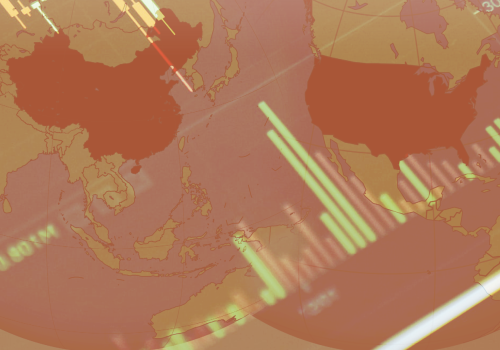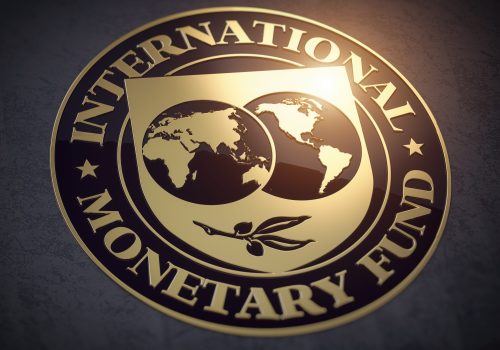The United States just sent a strong message to the IMF
The United States has rarely criticized the International Monetary Fund (IMF) in public, preferring instead to wield its influence as the largest shareholder behind closed doors. The last time the US Treasury openly criticized the IMF was in 2005, when it accused the lender of being “asleep at the wheel” with regard to China’s renminbi exchange rate. This resulted in the IMF’s so-called “2007 Decision,” a bureaucratic monstrosity that aimed to determine which countries were in violation of their policy obligations under the IMF Articles of Agreement. While the rule kept the IMF tied up in knots for years, China simply put its annual dialogue with the fund on hold, and the rule was eventually rescinded after global current account imbalances declined following the 2008 financial crisis.
It therefore came as a surprise to see the US Treasury Department’s undersecretary for international affairs, Jay Shambaugh, give a tough appraisal of the IMF and its leadership in a September 7 speech at the Center for Global Development. Shambaugh urged the institution to use its economic surveillance mandates to “speak truth to power,” and he urged the IMF to insist on stronger economic reforms in its programs intended to help countries out of financial difficulties. In addition, he argued for restoring the traditional division of labor between the IMF and the World Bank by letting the Bank focus on “structural” policies—such as climate change adaptation and mitigation—and keeping the IMF concentrated on macroeconomic developments.
The United States needs to ensure that the IMF’s fundamental business model remains valid: Loans should only be provided in exchange for economic reforms.
Although couched in careful language, his critique no doubt caught the attention of the IMF’s management team. Shambaugh argued that the IMF was deficient in some core areas. And he called for the IMF to pull back from its climate-related work, which has been a major area of focus in recent years.
Shambaugh’s speech did have a larger aim, however. By reminding his audience of the IMF’s true purpose, the speech sought to prepare the ground for a capital increase (also known as a quota increase) that could boost the institution’s lending capacity. Unlike the World Bank and other multilateral development banks (MDBs), which use their capital to borrow private money through bond issuances in global markets, the resources for IMF loans are directly provided by its largest shareholders, especially those whose currencies are globally traded. A capital increase for the IMF could therefore signal larger loan volumes, providing additional financial relief to borrowing countries if deployed properly.
Shambaugh’s remarks should be seen as part of the Biden administration’s strategy to employ multilateral lenders for geopolitical advantage. In pushing for an IMF quota increase, the United States is trying to deflect criticism that the Western world is failing to help low-income and developing countries reduce poverty and mitigate the effects of climate change. By itself, this is a laudable effort, and leveraging loans by multilateral institutions is a realistic strategy, given tight public budget constraints in the face of rising debt levels and high interest rates.
To make this strategy work, however, the United States needs to step up its engagement at the IMF. That’s because capital is not the biggest constraint on IMF lending.
The IMF’s outstanding credit volume is currently around $150 billion, which is equivalent to only 24 percent of its capital or 15 percent of its total lending capacity (which includes funds that the IMF could borrow from large member countries in addition to its capital). Increasing the IMF’s capital would likely occur against a reduction in borrowing agreements (in part because the United States would be unlikely to get fresh funds appropriated by Congress), with the result being that the IMF’s overall lending capacity would likely remain unchanged at around one trillion dollars.
Therefore, a decision to increase loan limits for individual countries does not depend on a capital increase. Underpinning IMF lending with a larger capital base would of course be beneficial, but the IMF still has ample resources to lend, and its preferred creditor status provides a strong protection against potential loan losses.
This gets to the real issue facing the IMF: whether its policies and lending practices can ensure that higher loan volumes will be put to good use and eventually repaid. Shambaugh’s remarks do not reflect much confidence in the IMF’s current ability to do so, given the problems it has encountered with large borrowers that are grateful for the money but reluctant to live by the conditions that are attached. Argentina, which reneged on its fiscal targets right after the last loan tranche was received, is the most brazen example, but there are other countries that have come back time and again for more loans without addressing their underlying structural problems.
It is here where the United States and other large shareholders need to primarily engage. With their majority in the IMF Executive Board and geopolitical clout, the Group of Seven (G7) and associated countries need to find ways to hold IMF management responsible for bad lending decisions, while incentivizing borrowing countries to uphold their end of the bargain.
This may not be the arms-length arrangement that the IMF’s founding members intended when they set up the Bretton Woods institutions. However, in today’s geopolitical environment, in which China and other countries are actively undermining the existing global order, Western countries don’t have much of a choice unless they are prepared to see the IMF lose more of its already diminished effectiveness.
Unlike in 2005, the United States needs to engage forcefully to keep the IMF fit for purpose. Shambaugh’s speech was smart politics, putting China on the spot to support a capital increase without providing for an overdue increase in its voting share. But this is not the end of it. The United States needs to ensure that the IMF’s fundamental business model remains valid: Loans should only be provided in exchange for economic reforms. Anything else would undermine confidence in the world’s official lender of last resort and deprive Western democracies of a critical asset in their fight to maintain a rules-based global economic order.
Martin Mühleisen is a nonresident senior fellow at the Atlantic Council’s GeoEconomics Center and a former IMF official with decades-long experience in economic crisis management and financial diplomacy.
Further reading
Mon, Oct 9, 2023
How the IMF can navigate great power rivalry
Issue Brief By Hung Tran
Fragmentation resulting from geopolitical competition between large economies is posing a serious challenge to the fulfillment of IMF's core missions. Here's how it can respond.
Mon, Oct 9, 2023
Less is more: Fewer reports would improve the IMF’s global surveillance
Issue Brief By
To improve its global analysis, the IMF should consolidate its conjunctural analysis into a single, shorter, and more pointed report.
Mon, Oct 9, 2023
Reimagining Africa’s role in revitalizing the global economy
Issue Brief By Amin Mohseni-Cheraghlou
The African continent potential to revitalize the world economy and reverse the downward trend in global growth. However, for this to materialize, it needs substantial investments in its physical and social infrastructure.
Image: A participant stands near a logo of IMF at the International Monetary Fund - World Bank Annual Meeting 2018 in Nusa Dua, Bali, Indonesia, October 12, 2018. REUTERS/Johannes P. Christo



